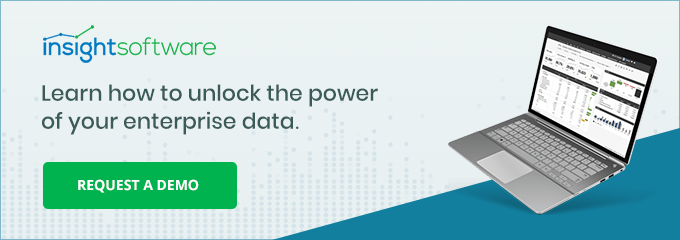How Intelligent is Your Financial Intelligence Process?

Financial intelligence. Traditionally, this meant tracking a small set of numbers at occasional intervals, such as in the month-end close or the quarterly financial report. Companies thought they could understand everything (or at least enough) by focusing on a fixed point in the past. While that may have been adequate then, it’s not adequate now.
As finance has evolved throughout the 21st century, so has the definition of financial intelligence. Instead of accepting a snapshot of past financial performance, CFOs now expect live streaming video, meaning the newest financial performance data made instantly available in as much detail as possible. Today’s financial intelligence constitutes a kind of higher-ordered financial thinking characterized by analysis and the proactive pursuit of insights. It’s everything yesterday’s intelligence was not: dynamic, strategic, forward-looking, and real-time. And it encompasses these features:
- Aptitude – It goes without saying that financial decision-makers must understand accounting basics like the back of their hand. That includes things like reading financial statements, balance sheets, and cash flow reports. The wider this aptitude extends (ideally outside of the accounting department), the more intelligent an organization is.
- Insight – Financial performance is both a statement of truth and an outcome of interpretation. Decision-makers must understand where their insights are coming from, what kind of logic and assumptions have been applied to them, and how that affects the meaning of the numbers. To put it differently, intelligent companies can look at their own numbers objectively.
- Analysis – Data has very little value in its raw form. Companies must be able to analyze data to locate the actionable insights within if data is to be a meaningful decision-making tool. A successful analytics effort systematically collects, integrates, and analyzes data before seamlessly distributing it to whoever needs it. The more efficient the process is, the more intelligent the organization becomes.
- Context – Insights are not islands. Interpreting what they mean involves putting them in the context of the company’s past performance, competitive climate, or current strategy, for instance. Financial intelligence means knowing how any fact or figure fits into the larger context of finance and enterprise performance.
Ask most CFOs whether their F&A team possesses financial intelligence and they would quickly answer yes. Yet two recent surveys suggest confidence is lower than advertised. In a Deloitte survey, 67 percent of the 1,048 executives who participated said they were uncomfortable accessing data using the tools they have available. They prefer to ask an accountant or someone from IT to retrieve data for them.
In another survey from KPMG, 43 percent of companies struggled with analytics because of data quality issues. Respondents identified this as the single biggest challenge to becoming more data-driven, followed by the difficulty of integrating legacy systems with new analytics tools. Together, these surveys reveal that companies often appear to be more intelligent than they really are.
Are you one of these organizations? The only way to know is to look for red flags. With that in mind, here are some indications that your financial intelligence isn’t as smart you think.
- You Rely Entirely on the ERP
ERP systems exist to collect, manage, and store data. Many come with built-in data reporting tools, but they’re not a core feature and tend to be underwhelming as a result. If you’re relying entirely on your ERP to explore data, or some combination of the ERP and Excel, you’re likely overlooking more than you realize. That’s because when it’s difficult to generate insights, people will pursue the path of least resistance. Technology can be an obstacle or a solution.
- You Work with Data Manually
Historically, accountants have managed data by hand, transferring it between sources and manually keying in data. This approach has always been inefficient, and that problem has only grown as accounting departments have begun managing more data at higher speeds from new sources. Whenever accounting involves manual inputs, companies must question whether the process is even adequate, to say nothing of intelligent.
- You Often Discover Errors
Related to the previous point, any time humans manually manipulate data, they introduce the risk of errors. Typos are a fact of life, but errors and omissions inside accounting data can have serious consequences. Worse, those consequences are now more probable with data volumes rising rapidly. If you often discover errors on financial reports or in other aspects of accounting, you’re probably missing many other mistakes and underestimating the damage it does to decision making.
- Your Reporting Lags Because You Lack Real-Time Capabilities
Some aspects of accounting like the month-end close are naturally time-sensitive, while others like performance reporting don’t necessarily have a deadline but are more beneficial sooner rather than later. In both cases, speed matters, yet the processes in place to manage data are slow by design. Not surprisingly, decision-makers tend to get the information they need long after it has the most to say.
- You’re Preoccupied with the Basics
When the processes for generating financial intelligence are all-consuming, people focus more on finding insights than understanding what they say. Think of this as looking backward instead of forward. The CFO puts all the effort into getting data when the entire focus should be on using that data to formulate strategies and forecast circumstances.
- Your Reports Are Static
Financial intelligence may be limited by the financial reports themselves. Considering how much time and resources go into building these documents, they should be filled with clear insights. Instead, many rely on confusing designs that obscure what’s being said, and they only deliver enough data to make broad judgments. Reports that should incorporate intuitive designs, advanced visualizations, rich customization options, and drill-down capabilities often do just the opposite. Whatever intelligence they offer is a pale version of what’s available.
You’ve probably been evaluating your organization as you’ve been reading through this list. Your initial impressions matter, but it’s worthwhile to take some time to explore each point in depth. Ideally, this involves the entire accounting department as well as stakeholders outside finance who utilize financial reports. Quantify how much your team invests producing reports, then be honest about the impact those documents have. Are they really guiding your company toward a stronger financial foundation, or have they become a source of uncertainty and paralysis?
If your financial intelligence needs an IQ upgrade, partner with insightsoftware. Our suite of financial reporting tools effortlessly integrates with dozens of leading ERP solutions and transforms how everyone with a stake in finance engages with insights. When you’re ready to discover how smart your organization can be, contact us and request a free demo.









